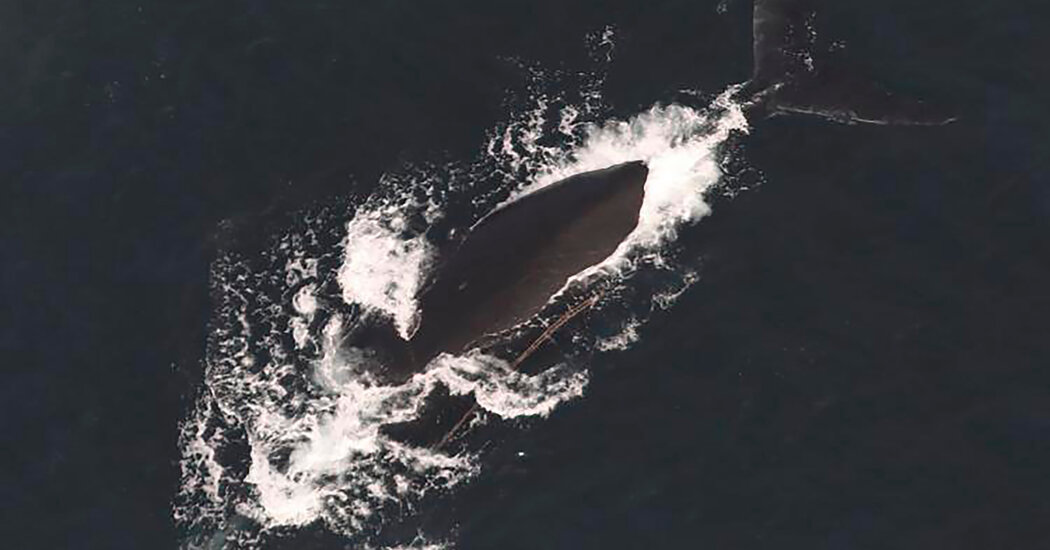The North Atlantic right whales, which were seen off the coast of Massachusetts, are one of the most endangered large whale species.
Two endangered whales have been found entangled in fishing gear off the coast of Massachusetts, and one of them is likely to die from his injuries, according to the federal agency that monitors the oceans.
The mammals were identified as North Atlantic right whales, one of the world’s most endangered large whale species. They face threats in their habitats from entanglement in gear and collisions with vessels, and there are now fewer than 370 left in the world.
On Dec. 9, an aerial survey spotted the whales swimming about 50 miles southeast of Nantucket, the National Oceanic and Atmospheric Administration said in a statement on Tuesday.
One whale, identified as male #5110, has serious and most likely fatal injuries. A picture showed that he had a thick line resembling a fishing line that passes across his head and back.
“This designation signifies #5110 is likely to die from this injury,” according to the statement. That whale, which was first seen as a calf in 2021, was last seen in April, swimming in Cape Cod Bay in Massachusetts.
Oceana, a conservation group, said that when such an entanglement occurs, a fishing line can be so tightly wound around a whale’s body that it “cuts into flesh and bone” and causes an infection.
The second whale, identified as adult female #4120, has two lines exiting the left side of her mouth and extending half to two thirds of the way down her body, the federal agency said.
Biologists believe the female whale has a so-called sublethal injury, meaning that the injury will not kill her but “can reduce or impair” her well-being.
The female whale was seen in July without any entanglements about 50 miles off the coast of Long Island in New York.
The agency will “work with authorized responders and trained experts to monitor the whales,” it said in its statement. It will “further document the entanglements and determine if entanglement responses will be possible.”
For centuries, fishermen hunted North Atlantic right whales for their blubber, which was used in cosmetics, leather and soap. It has been illegal to hunt them since 1935, when the League of Nations put right whales under protection.
The whales usually live within 30 miles of the East Coast of the United States and Canada, and adult right whales can grow to be between 45 and 52 feet in length and can weigh as much as 70 tons, NOAA said.
Conservation groups have been calling for fishermen to use gear with less rope or to use on-demand or ropeless systems to protect the species, which, according to the NOAA, are approaching extinction.
Among the whales remaining, fewer than 70 are reproductively active females, according to the NOAA.
In January, a right whale that had died from an entanglement was found near Martha’s Vineyard in Massachusetts, the agency reported, and a female North Atlantic right whale with rope wrapped around it was found dead off the coast of Martha’s Vineyard.
